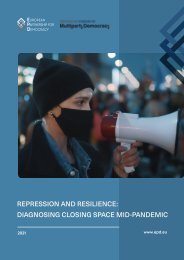Thinking Democratically: A Comprehensive Approach to Countering and Preventing Shrinking Space
Create successful ePaper yourself
Turn your PDF publications into a flip-book with our unique Google optimized e-Paper software.
Abuse of state resources <strong>and</strong> institutions<br />
A frequently used tactic for creating an unlevel playing field is the abuse of state resources <strong>and</strong><br />
institutions by the ruling party, as it provides the ruling party with an unfair economic <strong>and</strong> political<br />
advantage. This ranges from the selective enforcement of elec<strong>to</strong>ral law by the elec<strong>to</strong>ral management<br />
body <strong>to</strong> the usage of development programmes <strong>and</strong> financial means of the state for elec<strong>to</strong>ral gain.<br />
For instance, ahead of the 2013 <strong>and</strong> the 2017 elections, the Honduran government implemented a<br />
programme nick-named ‘Bonus 10.000’, where families in precarious economic situations received<br />
cash transfers by the government conditional on health center checkups or school enrollment of their<br />
children. Researchers studying the Bonus 10.000 programme in Honduras after the 2013 elections<br />
showed that the lump-sum transfers had substantial political consequences, as recipients felt obliged<br />
<strong>to</strong> reciprocate <strong>to</strong> the government – <strong>and</strong> thus the ruling party. 48 The size <strong>and</strong> timing of the payment<br />
closest <strong>to</strong> the election had a major impact. This is particularly important considering they found a<br />
substantial number of transfers were delayed <strong>and</strong> larger than prescribed. The case study found that<br />
for the 2017 elections, several politicians overtly used the cash transfer <strong>to</strong> request a vote in return.<br />
The abuse of development projects or social benefits for increasing the popularity of the government<br />
ahead of elections is not unique <strong>to</strong> Honduras, but a recurring phenomenon. In Kenya, the ruling<br />
Jubilee party symbolically launched development projects in the constituencies that voted for them,<br />
thereby coopting opposition legisla<strong>to</strong>rs <strong>to</strong> work with them “so that their constituencies can ‘access<br />
development’”.<br />
A majority of case studies also demonstrate that the ruling party had more <strong>to</strong>ols <strong>and</strong> resources at<br />
their disposal for campaigning than the opposition in each election. In Zimbabwe, this was blatantly<br />
obvious in the 2018 election, with even the EU Election Observation Mission noting the extreme<br />
disparities in resources between the ruling party <strong>and</strong> the opposition alliance. 49 The ruling party is<br />
even said <strong>to</strong> have gone in<strong>to</strong> major national debt with campaign investments in 2018, abusing state<br />
resources for party survival. 50 Such abuse of state resources by the political players in power – for<br />
their own political survival – is the most common way of creating an uneven playing field.<br />
A less direct way for the ruling party <strong>to</strong> tip the scales in their favour is by exerting influence over<br />
other state institutions <strong>and</strong> governmental bodies, in particular the elec<strong>to</strong>ral management body. This<br />
is often reflected in the refusal <strong>to</strong> implement existing laws that regulate political parties’<br />
campaigning, financing <strong>and</strong> operations. Elec<strong>to</strong>ral management bodies are often under pressure not<br />
48<br />
Galiani, S. et al. (2018): Voter response <strong>to</strong> peak <strong>and</strong> end transfers: evidence form a conditional cash transfer experiment.<br />
Working paper 22588, National Bureau of Economic Research. Available here.<br />
49<br />
Final Report, Republic of Zimbabwe, Harmonised Elections 2018. Available here.<br />
50<br />
Interview Hugo Knoppert, 20 February 2019, Brussels.<br />
22

















